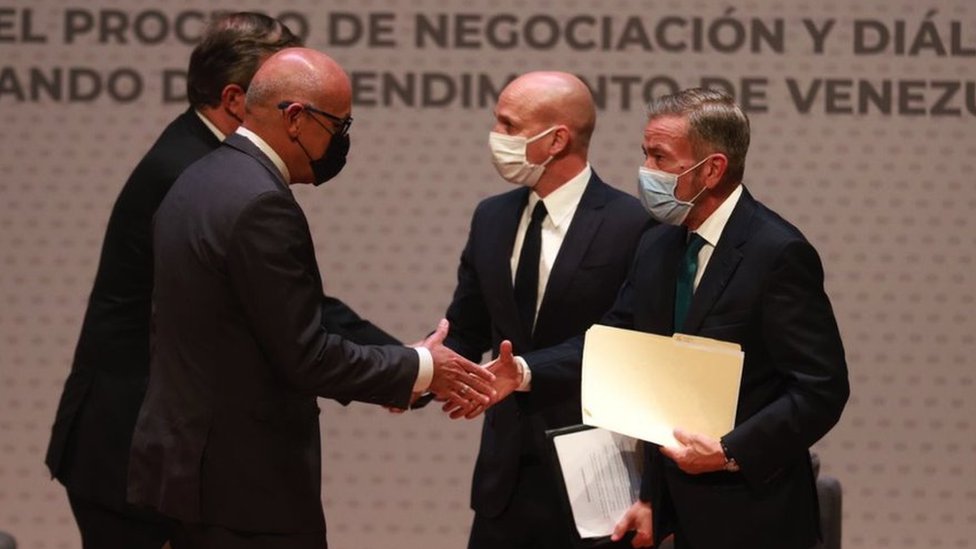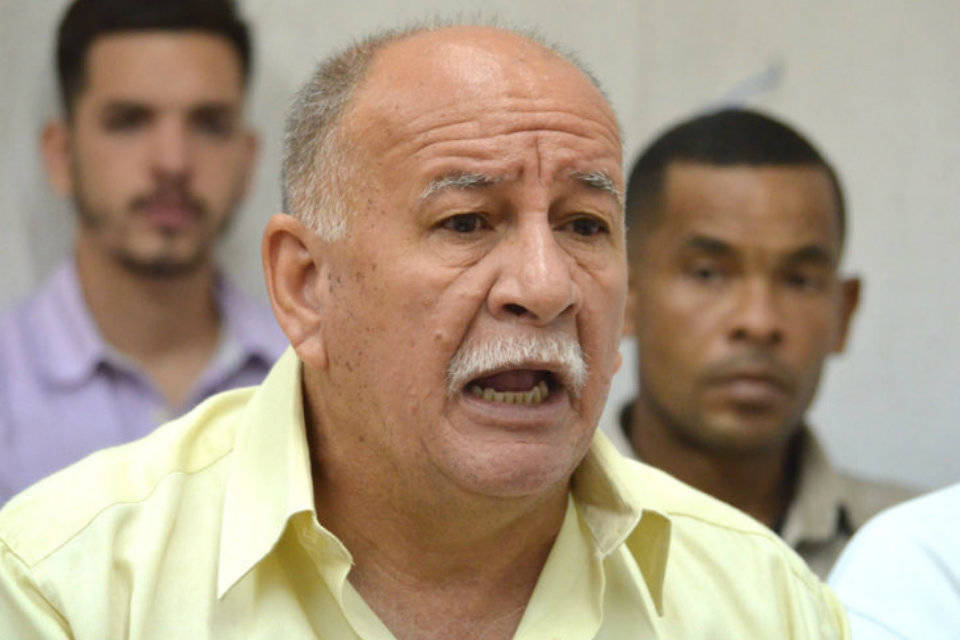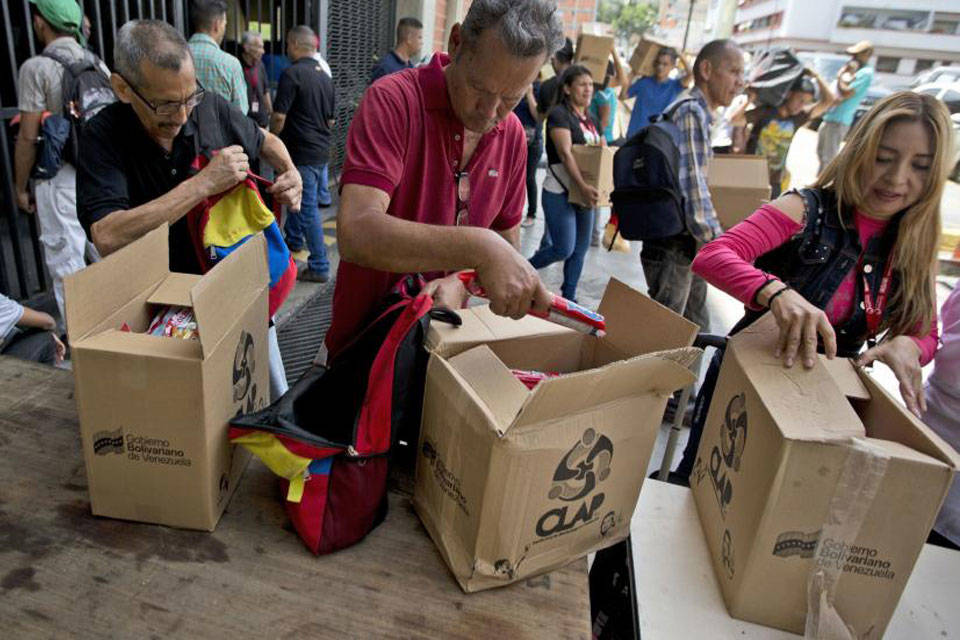On June 18, Bloomberg aired an interview with Maduro, whose plan for an economic opening up seems to continue. Every day, the National Assembly increases the number of laws to reform or approve. The country moves toward a Maduro-style political architecture. In political terms, the most important thing about the interview was the “Maduro-style logic” behind the negotiations. The main issue to solve at this stage is who takes the first step in turning the conversations into a negotiation. The US has stated that Maduro has to take the first step, while he claims that the first move belongs to the US. The ball will change courts once and again, and time could be wasted in the process, but solving this problem seems crucial to achieving viable and politically substantive negotiations between the government and the opposition. Is the visit of the European Union’s chargé d’affaires to the National Electoral Council and the joint statement by the EU, the US, and Canada that first step? I will analyze it in this article
On June 18, Bloomberg TV broadcasted an interview with Maduro that lasted about 1 hour and a half. The next day, the Venezuelan public TV stations aired it at primetime.
The interview brought criticism on social media. Mainly because it was conducted by Bloomberg and many took it to mean that the agency “whitewashed” the Maduro administration with questions from a complacent journalist.
I don’t see it that way. The behavior of the Bloomberg journalist was not different from that of the NBC journalist who interviewed Putin on June 14, on the eve of his meeting with Biden, in a conversation that extended for almost the same time as Maduro’s interview. The Bloomberg journalist made the famous “characterization of the regime” often used by the radical opposition: a corrupt, authoritarian government that represses opponents, a country with a humanitarian crisis that has become “more dangerous than Afghanistan.” That’s what the Bloomberg journalist told Maduro. The correspondent also criticized the government’s vaccination strategy. The “characterization of the regime” made by the journalist was much more concise and stronger than the one made by the radical opposition from the comfort of a tweet.
I think it was an agreed-upon interview, not in the sense of easy questions but in agreeing on an agenda, perhaps to avoid a situation like Maduro’s interview with Jorge Ramos in June 2019. In Bloomberg’s exchange, the journalist read all the questions in Spanish. Maduro clearly learned this from his experience with Ramos in 2019 and appeared open to Bloomberg’s questions. The journalist knew that Maduro could have declined the invitation, but she managed to get the interview, possibly after agreeing on the agenda.
People in Venezuela are still stuck in the “Jorge Ramos style”. From the comfort of their couches, they think that the task of a journalist is to “tell things” to illiberal or authoritarian presidents. This could be seen at Putin’s press conference after he met with Biden. Some journalists “told him off”, but that style is nowadays ineffective and even unfortunate. Those who fight for power with limits must rethink their strategies when interacting with illiberal or authoritarian leaders. Mainly the media and journalists.
I think that more than “telling him off”, journalists have to ask, put the situation in context, and bring up the underlying issues. Let the president speak. Journalists question but do not judge. They avoid the type of questions that look judgmental. They ask difficult questions that reveal dilemmas, challenges, gaps, certainties, and contradictions in the interviewee.
What is valuable about Bloomberg’s interview with Maduro is that it made visible the problems for building the possibility of alternation in power. I observed three important issues in the interview.
The first of them is the “Maduro logic.” To understand the government and its policy towards the United States, one must start from this logic. This logic is set in motion both in the international field and at home.
The “Maduro logic” consists of analyzing a situation or problem from different perspectives, including from the “contradictions”, as he affirmed during a public event on June 18. Maduro conducts the due diligence of the problems in the search for political solutions. He does not get stuck in the analysis. Some solutions can be bold or take him out of his inertia for a while.
The 2017 National Constituent Assembly, the opening up that began in 2018, or the creative measures taken at the beginning of the pandemic in March 2020 are some of these solutions. More recently, the announcement of primaries in the ruling party or the mention of a commission to investigate the reasons behind the overcrowding in prisons. The judicial delay and the dollarization of justice have been around for a while, but the government seems to have just realized it and considered it a time bomb if not addressed. The proposed solution is the creation of a commission headed by Diosdado Cabello – the go-to man for complicated tasks – and Cilia Flores, who will be the direct link with Maduro. Time eventually says if the solutions to the problems defined by the government are imperfect, manipulated, incomplete, or an utter staging. The government has its own entropy, but the solution that is devised at a given moment allows it to move forward. At least in the short term. This is one face of the “Maduro logic”. But there is another.
Timing. Knowing the meaning of political opportunity. It is not passive waiting because things get done in the meanwhile. For example, the government chose to wait to hold parliamentary elections on the date provided for in the law, December 2020. But this is not always the case. Remember that Chavismo considered calling snap parliamentary elections in 2019. But in its analysis, the government probably pondered that it was better to wait for December of last year and handle the political tension with the “nerves of steel” that Maduro often mentions.
Another example is the legislative agenda defined by the National Assembly. We must remember that the National Constituent Assembly had proposed to reform the constitution. Even though a draft was never made public, Escarrá said that the proposal did indeed exist. This is probably true, but the Government’s analysis may have shown that advancing a constitutional reform with a questioned Constituent Assembly would have brought more disadvantages than advantages. The Government waited for the election of a new parliament that now speaks of reform or new bills every day. Simply put, the National Assembly is making the major changes that the National Constituent Assembly could not.
Finally, amid political changes in the region, Chavismo waited and met on June 24 with representatives of the ALBA-TCP alliance. In the final declaration, Maduro proposed to emphasize their wish to “come to the rescue of CELAC and Unasur,” two of the organizations created during the progressive wave of the first decade of the XXI century. The government waited and now considers the need to promote those two organizations because it is the political moment to do so, amid a weaker right in the region.
The two faces of the “Maduro logic” could be seen in the Bloomberg interview when speaking about Venezuela’s relations with the United States. This is the second point that I noticed in the conversation.
Relations between countries are determined by multiple factors. For example, the foreign policy and the interests of the states, but also the personality of presidents. In the case of Venezuela-US relations, US domestic politics and Maduro’s personality play a key role.
The Bloomberg interview revealed a major political problem. How to turn the talks between the government and the opposition into real negotiations? Because neither of the two countries wants to take the first step to advance the conversations. Maduro hopes that the US will open a channel with the government, and this is where the “Maduro logic” comes in. From what he told Bloomberg, the administration went a long way to approach Trump. It almost made it, but Trump lost the election. Maduro showed that he would have liked a Trump victory because a channel of communication with the US had already been built. That’s the “Maduro logic”: doing things.
In the case of Biden, as Maduro also affirmed, there are no signs of detente or rapprochement in the first 5 months of the new US government. Biden has only stated that the dialogue should be held between Venezuelans. So, Maduro waits for the moment to formulate his point. He doesn’t seem to be doing anything to get closer to the US because Biden’s policy involves not reversing the decisions taken by the Trump administration, except for things that have an impact on the population. These reversals are temporary and limited; for example, the US decided not to include Venezuela in its vaccine donations program and now expects Maduro to sit with Guaidó. The initial step is on Maduro’s court.
In my opinion, the most interesting part of the interview, and the most valuable minutes from a political point of view, was when the journalist eagerly sought an answer from Maduro as to whether he is willing to compromise to improve his relationship with the US. Maduro said no, “we would reach a dead point, Erick” (if the government makes initial concessions). Then the journalist, seeing Maduro’s stubbornness, sincerely told him, “you know what I’m looking for, and I want to explore if there is a window of opportunity with the United States.” Maduro answered that the “window of opportunity” is for the US to open a channel of communication with the government. The first step here belongs to the US, without the Maduro government having to make any initial concession.
The big political problem is that neither country will take the step. The media reported that the State Department responded to Maduro in the following terms: “You must take the first step.” Neither of them will. There may be talks, or Norway could facilitate some meetings, as Maduro recognized, but negotiations as such will not take place because Maduro considers that he does not have to make initial concessions, and the US reasons that they do not have to open a channel with Maduro if there are no initial concessions from the Venezuela government.
Here is the real political problem: how to turn the Norwegian efforts, for example, or the previous meetings into a situation of real negotiations in which the government accepts discussing two issues, political alternation, and reparations. For its part, the opposition faces the problem of accepting the recognition of the government, not in terms of “incentives” to bow to a specific group but in terms of formal political recognition. If the problem revealed by the Bloomberg interview is left unsolved, we risk a repeat of the recent history of negotiations between the government and the opposition in which talks abound but no agreement is reached.
Even though it is not anything new, a third important point is that the “Maduro-style” economic opening-up will continue. A good part of the interview was spent on the economic issue. Maduro expressed that they presented the bondholders with a viable program for the payment of the debt. Despite the situation in Venezuela, Maduro remains faithful to the thesis of paying the country’s debts and avoiding default whenever he can; we must bear in mind that the current one had not his consent. He told the journalist, “If I had 17 billion dollars to pay the bondholders today, how could I dodge the sanctions?”. This may surprise many, but Maduro shares Juan Vicente Gómez’s vision of honoring the international arrears of the country. Of course, this assertion has the political objective of encouraging investors to lobby before the Biden government for a reconsideration of the sanctions policy against the Maduro government.
Maduro also told US investors not to miss the opportunity and offered guarantees to their investments. Maduro seems to be appealing to the stereotype of American investors, whose business pragmatism is stronger than their ideology.
Maduro takes the measures but distances himself from them to lower the political cost to his image. However, he now has his “other voice”, which is his son. Maduro Guerra sees himself as “a modern, open-minded young man”, whose flag is the defense and promotion of the project for Exclusive Economic Zones and, in a recent interview with AFP, even criticized the policy of expropriation. Maduro Guerra is a sort of representative of “Chavista capitalism”, a group in which Rafael Lacava and José Vielma Mora may also find themselves. Maduro is building the political viability of his opening up so that it is not assumed as a “betrayal of Chávez’s legacy” but as the natural transit from socialism “under blockade” to the “Social welfare state” experienced in much of Chávez’s era.
Will the first step be taken to make the negotiations viable? This is the one million dollars question.
As explained before, there will be no real negotiations as long as both sides remain reluctant to take the first step or refuse to make simultaneous concessions. The US can wait until a certain point to decide on reconsidering its Venezuela policy or “increasing the pressure”, as was Juan González’s approach.
But this does not worry Maduro much. He does not want the sanctions, but he “is not dying” to have them lifted “at any cost”. This is the “dead point” he told the Bloomberg reporter. The result is that both the US and Maduro are in a position to wait for a little while without major turbulence.
What can be done to make the negotiations happen? Guaidó’s answer is to “increase the pressure” through sanctions or offer “incentives” to see if someone defects from the top leadership and the “rupture” of the ruling coalition, much anticipated by the four biggest political parties of the opposition and their supporters, becomes a reality. A scenario that is thought to have the potential to bring about the “transition”. This is what the four biggest parties of the opposition are trying to do again with the relaunch of the “Guaidó” brand, which includes Blyde’s trip, street activities, and popular mobilization in support of the “National Salvation” agreement on July 5. Yet, this is what the faction has been doing since January 2019 to no avail. But they can continue on this path and wait, which is what the interview with Guaidó, also conducted by Bloomberg, revealed.
The other answer to the problem is building the negotiation, which is Capriles’ proposal and the one that Maduro expressed in Bloomberg, “I believe in incremental negotiation.” The risk is getting stuck in an eternal process because of the lack of “incentives” for moving on and yielding results.
In my view, the second path is better than the first one, but the big point here remains who takes the first step or how to build the confidence to take it. The logical thing is that while the negotiations are being built, the opposition participates in electoral and social events that connect it with society and bring it back to the political debate on proposals and ideas to become a political alternative to the government.
On June 25, two events occurred that may indicate that the first step has already been taken or is about to be taken. On the one hand, the European Union’s chargé d’affaires informed the National Electoral Council that an exploratory mission will visit Venezuela on July 6 and will stay in the country until July 23. The envoys will study whether to send an observer mission for the November 2021 elections.
The second event was a clear-cut and plain joint statement from the European Union, the US, and Canada reversing the order of the factors. Unlike in the past, they only showed the “carrot” this time. They did not speak of the “stick.” The statement is written in terms of incentives. The European bloc and the two countries stated that the sanctions may be reviewed if significant steps towards a political opening up are taken. The joint text added that this political opening up in Venezuela can begin with regional and municipal elections. Could this be the first step?
Just for highlighting all the issues analyzed in this article, Bloomberg’s interview with Maduro was worth it despite the outrage among some people in opposition that get offended by everything but fail to go beyond complaining.
Translated by José Rafael Medina




